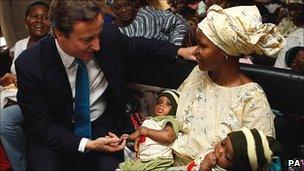David Cameron defends UK's foreign aid programme
- Published
- comments

The PM wants to see investment focused on more measurable things such as vaccines
David Cameron has defended the UK's commitment to spend 0.7% of national income on foreign aid by 2013.
But Britain will "use aid differently" to ensure it is well spent, the prime minister told an audience in Nigeria.
He was speaking as a survey of public opinion in the UK suggested many people felt the country's foreign policy had changed for the worse in the last year.
The top priorities ought to be protecting borders and countering terrorism, its results suggested.
Mr Cameron has cut short a planned four-day trip to Africa so he can prepare for his statement to Parliament on Wednesday on the phone-hacking scandal.
But before leaving he used a speech to the Pan-African University in Lagos to reinforce Britain's aid commitment and spell out the potential for UK countries trading in Africa.
UK aid spending should be targeted at projects to deliver infrastructure like customs services, roads and the internet and to train business leaders, mathematicians and scientists, he said.
Trade opportunity
This could kick-start growth and development and help Africa move off aid altogether, the prime minister added.
"We see Africa in a new way, a different way. Yes, a place to invest our aid. But above all a place to trade," he said.
Britain must increase its 4% share in exports to Africa, he said, promising to use loan guarantees and trade finance to help UK companies win contracts.
Earlier, he had visited a clinic in the capital Lagos, where babies were being vaccinated against yellow fever.
The Department for International Development operates a scheme in Nigeria to monitor vaccination rates, train nurses and reach out to women who might otherwise miss out on health care for their children.
Policy 'worse'
Meanwhile, the survey conducted by think tank Chatham House, external and polling company YouGov, also found that many people believed Britain spent too little equipping its armed forces and too much on contributions to the EU and on overseas aid to developing countries.
The poll questioned two groups, members of the general public and "opinion formers" drawn from a YouGov panel of figures from the business, media, politics, academia, science and arts spheres.
Of the members of the public surveyed, 65% thought Britain's foreign policy had changed for the worse over the past year.
Nearly 60% thought much overseas aid was wasted and did not promote Britain's interests. And only 20% thought the UK had a moral right to support pro-democracy uprisings in places such as Egypt and Libya.
Nearly half of those questioned thought the UK should not be involved at all.
A Foreign Office spokesperson said the government rejected any notion that Britain's role in the world was shrinking.
He said the repositioning of UK foreign policy was to secure its prosperity and security in the long term.
- Published6 April 2011
- Published1 March 2011
- Published20 July 2010